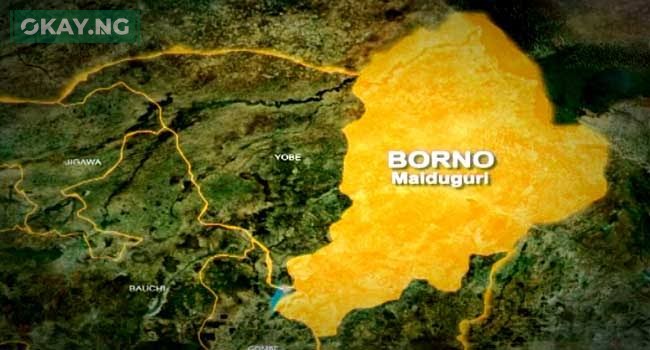Hundreds of villagers in Kirawa, Borno State, have been forced into an unusual daily migration pattern, spending daylight hours in Nigeria but fleeing across the border into Cameroon at night to escape possible renewed Boko Haram assaults.
The displaced residents say the crisis began after last Saturday’s attack on the town, which led to the withdrawal of troops from the area. Since then, they have scattered across several Cameroonian villages, sleeping in mosques, classrooms, and on open roads to avoid further insurgent incursions.
The District Head of Kirawa, Abdulrahman Abubakar, described the situation as unprecedented.
“We can no longer sleep with our two eyes closed as our people now juggle between two countries, sleeping in Cameroon at night and returning to spend the day in Nigeria. This is the first time we are experiencing such an attack since our community was resettled some years ago,” he lamented.
okay.ng reports that displaced resident Buba Aji recounted grim scenes in Cameroon.
“At night, the experiences are usually inhumane. On Monday night, heavy rainfall forced many of our people to sleep under the rain. Some took refuge in mosques, on roads, and in classrooms because we fear insurgents will return. We are currently in Kerawa, Cameroon Lamise, the streets immediately after crossing the Cameroon border,” he said.
Aji urged immediate military redeployment, stressing that no Nigerian soldiers remain in Kirawa, only Cameroonian Joint Task Force personnel who have now retreated.
“We are not in hundreds but thousands currently facing this,” he added.
Resident Atahiru Lawan estimated that 80–90% of the population has fled.
“Our people are lying on the streets of Kerawa, Cameroon — no accommodation, no aid, no assistance. Please, we are pleading with the government to come to our rescue,” he said.
Special Adviser to Governor Babagana Zulum on Security Matters, Gen. Ishaq Abdullahi (retd.), said the state government was aware of the displacement and working on it.
“You know our governor, the moment something happens, he will take action… he is on it,” Abdullahi assured.
The attack, which claimed soldiers’ lives and led to the abduction of a schoolgirl, has been mired in controversy after military authorities insisted the target was a Cameroonian base. However, the Kirawa Development Association’s chairman, Yakubu Mabba, disputed this.
“As we speak today, there are no Nigerian soldiers in Kirawa… if anyone wants to confirm that people were not displaced or kidnapped, they can come and see for themselves,” he said.
Buba Aji, who also teaches in Kirawa, noted the language barrier between residents and Cameroonian troops — who primarily speak French — further complicates protection. He detailed that the insurgents burned the district head’s house, a nearby shop, and fired for three straight hours before abducting student Aisha Muhammad Aja.
Residents fear the insurgents may return, with one witness stating bluntly:
“Our appeal is simple: we need protection… the kidnapped girl is yet to be released. We are scared of further attacks.”







